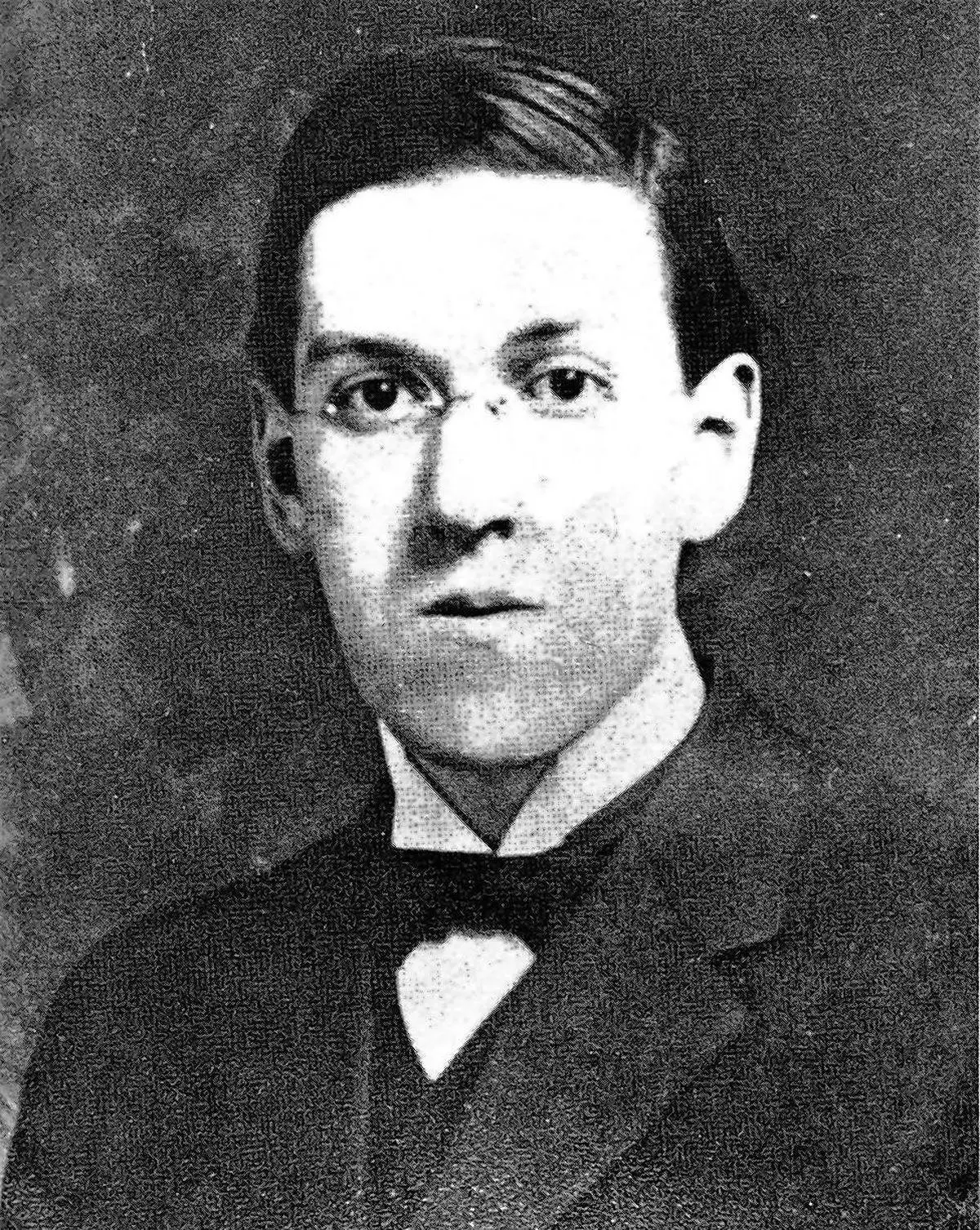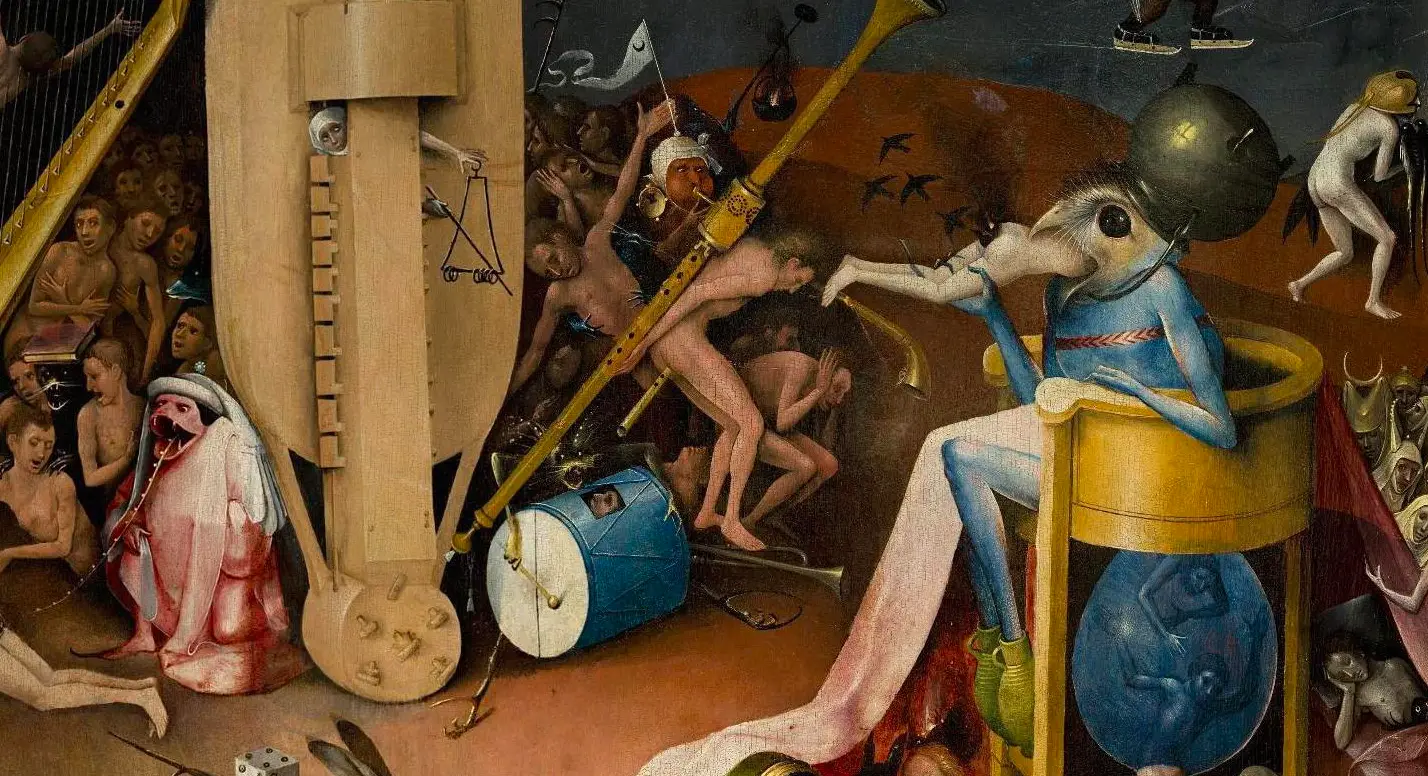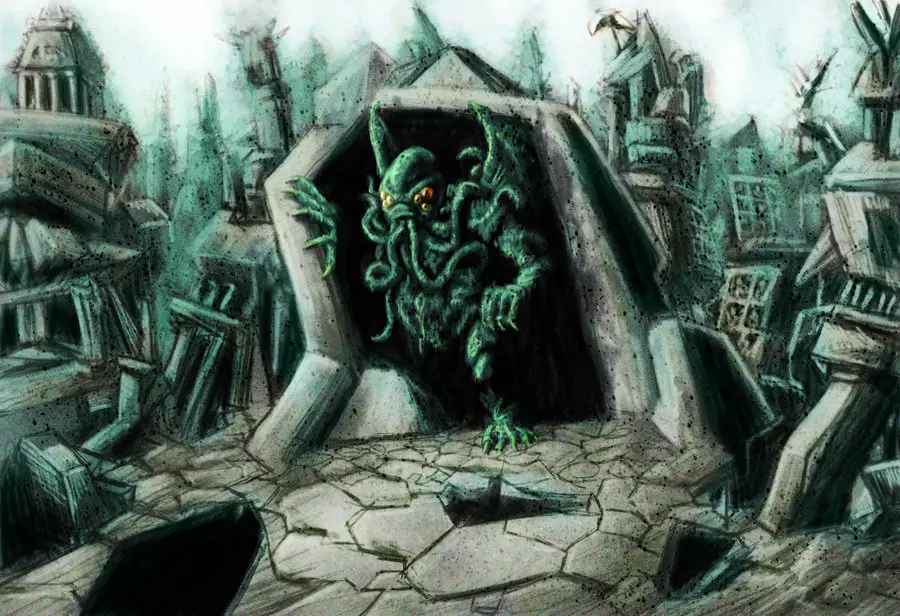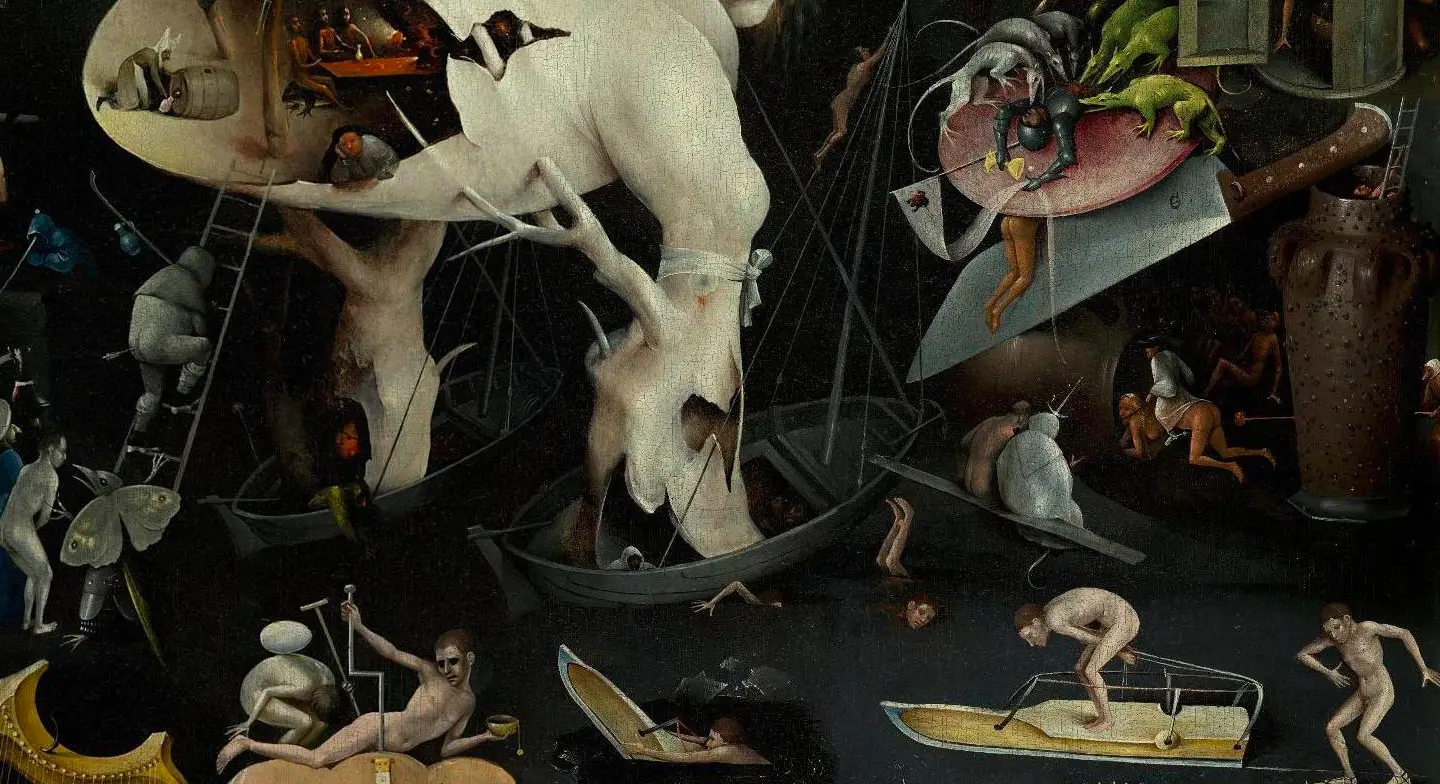As some "Sunday critics" say, Lovecraft always put before the alleged racial hatred the viscerally felt horror in the first person towards the advent of the modern world, the empire of machines and total depersonalization, in which every individual and his highest visions are swallowed up and inserted in a cosmic framework of universal tragedy, devoid of any higher outlet. And New York was, of course, raised in the image of the New Babel, which engulfs ancient traditions and human differentiations in a continuous, abject ritual of collective depersonalization, standardization and dehumanization.
di Marco Maculotti
Cover: Hieronymus Bosch, “Garden of Earthly Delights” (detail);
Originally published in «Lovecraftian Studies 19», Dagon Press, Spring 2021 –part 2 of 2
[continued from part 1]
Although certain xenophobic positions of Lovecraft cannot be denied in whole, nevertheless it must be emphasized that the existential battle of the latter was never founded on a presumed "racial question" of any kind, but should rather be framed as an act of the individual's out-of-date resistance against the impoverishment of the imagination and against the attack aimed at the mental and soul independence of the individual, dangerously endangered by the titanic rise, from the industrial revolution onwards, of the world of machines founded on the mobilization of the faceless masses, and on the democratic principle ofone is worth one, which he considered a beautiful and good illusion. Paradigmatic in this sense is what Lovecraft wrote in a letter of 1923 a JF Morton:
The only great crusade worthy of the enlightened individual is that fought against all that impoverishes the imagination, the marvelous, the sensory perception, the life lived intensely and the appreciation of beauty.: nothing else matters. And not even that really matters in the Great Void: but it's fun to play a bit under the sun, before the blind universe coldly reduces us back to that primordial nothingness from which it took us away for the duration of a moment.
[1]

The horror of the machine civilization
Nobody wants to deny that the trauma Lovecraft experienced when coming into contact with the "racial melting pot" of New York influenced his literature of the following years, but what is important to note considering the controversy engendered by Okorafor is that the alleged hatred racial the Providence Dreamer always put the viscerally felt horror in first person before theadvent of the modern world, the empire of machines and total depersonalization, in which each individual and his highest visions are engulfed and inserted into a cosmic framework of universal tragedy, with no higher outlet. And New York it was, of course, raised in the image of the New Babel, which engulfs ancient traditions and human differentiations in a continuous, abject ritual of depersonalization, standardization and collective dehumanization. In He, written in 1926, we read:
Coming to New York had been a mistake: I sought wonder and inspiration in the mazes of crowded old streets that wind from forgotten courtyards, squares and piers to other forgotten courtyards, squares and piers; but in the cyclopean towers and spiers that rise like dark monuments of babylon under the waning moon i had found only a sense of horror and oppression that threatened to paralyze and destroy me.
[2]
[…] Instead of writing poetry I fell into a terrible loneliness and despondency; and at last I sensed the terrible truth that no one dared admit, the unseemly secret that you don't even want to whisper: the fact that this city of stone and noise is not the clever perpetuation of old New York as London is of old London and Paris of old Paris, but which is actually dead, and the badly preserved corpse is haunted by strange animated beings that have nothing to do with what the city was in life.
[3]
From this very moment the Big Apple rises in the vision of the world of the Dreamer of Providence in New Babel, double terrestrial of the submerged R'lyeh, the paradigmatic capital of the Empire of Chaos soon to be extended to the entire planet, under the influence of the terrifying non-human entities coming from the Absolute Elsewhere. But in the action of the aforementioned titanic powers we can also see the demons created by hybris of Western science and modern rationalism, the golems created in the laboratory on the thrust of erroneous beliefs and false prophets that have led humanity towards the most total desacralization of the entire conception of life and of the cosmos, a position that among other things anticipates that of the German philosopher in a unique way Ernst Junger (see for example the Treaty of the Rebel, published in 1951, and At the wall of time, 1959).
It is also known that Lovecraft was influenced in these pessimistic predictions by the work of the equally German philosopher and historian. Oswald spengler, author de The sunset of the West (1918-1923) and Man and technology: rise and fall of the civilization of machines. In a letter to JF Morton sent in October 1929, HPL writes:
It makes no sense to pretend that a standardized and rigidly programmed civilization of machines like this one has points of contact with a culture that is based on the freedom of the individual, on individualism and the maturation of the personality; all that can reasonably be attempted is to oppose the future, with all one's might. Whoever thinks that man lives by means of reason and that he is perfectly capable of controlling the effects and consequences of the things he invents, holds a position that psychology proves outdated. For a while, man can actually use machines, but after a while he mentally gets used to mechanization and the state of dependence on the machine becomes such that it is the machines that use man. - flattening it on their perfect efficacy and on their absolutely useless exactness of action and thought… perfect functioning, without any reason or advantage for such functioning.
[4]

The future world for Lovecraft nearly a century ago was a hell of machines, depersonalization and standardization - a prediction that today sounds unspeakably sinister even though it seems to have been regularly fulfilled., especially in the last whirlwind years of global interconnection and Chinese dystopias based on the invasive use of technology towards the population (among other things in the story He, published nearly a century ago, HPL even predicted the total takeover of the Eastern potentate, imagining a futuristic New York in which the Chinese people have completely replaced the Western people). The horror felt by Lovecraft towards the world of machines based on the depersonalization and standardization of the individual is to be seen, in our opinion, as a central piece in his worldview, immensely more important than the issue of racism which in his work was so marginal as to be almost nothing. It is he himself, on the other hand, who repeatedly expresses this indisposition of his with his closest correspondents: in a letter to Woodburn Harris written in November 1929, for example, it reads:
[…] The civilization of machines is inferior to ours [that is to the traditional and rural one of New England, ed.] because it transforms into virtue a set of absolutely sterile values - speed, quantity, work as an end in itself, material wealth, ostentation, etc .: because this civilization despises the relationships that memory normally establishes with the environment and traditions, because it promotes homologation to the detriment of individualism, and because it results in the vicious circle of work that leads to nothing but the constant weakening of the natural principles of quality, resourcefulness, personality, and full development of the human spirit towards a perspective of complexity that distances it from animalistic instinct.
[5]
It is clear, therefore, how it is for Lovecraft spectrum of "atavistic regression" - influenced by the novels of Arthur Machen - is certainly not to be framed in the context of a supposed biological racism towards any race, but rather in connection with a general denial of the same characteristics - and, why not, also of differences (in this should see a real, healthy e desirable multiculturalism) - which make us human because they are cultural entities, linked anthropologically even before geographically to a land and a lineage that shares a common identity. And elsewhere he observes:
This background of traditions against which the entities and events of experience are to be measured is the only thing that gives these entities and events the illusion of a meaning, a value, a dramatic interest in a cosmos that is entirely at its root. without purpose: for this I practice and prede an extreme conservatism in art, society and politics, as the only way to escape the ennui, despair and confusion of a struggle without guidance or rules in a chaos not hidden by veils.
[6]

A New Dark Age
It is certain that Lovecraft was politically a conservative - although in the last years of its life, from 1932 onwards, as confirmed by private correspondence, it veered significantly towards socialist positions - and therefore a "undemocratic". This term which may seem so terrible today is, as we have said, to be seen as closely connected to the horror he felt when faced with the vision of the terrifying future - la New Dark Age of which vaticina in The Call of Cthulhu (1926) - which he somehow managed to see well in advance:
[...] mechanization destroys man and reduces the life of human beings to that of mechanical automata and simple animals. Humanism and democracy cannot coexist. Democracy means decadence: the triumph of the machine over the individual.
[7]
Staggeringly anticipating the world we live in today, Lovecraft added:
In 2100 or 2200 AD, the situation will be, in a nutshell, this: widespread domination of the barbarism of machines, characterized by incredible luxuries and the dominance of a ruling class made up of highly intelligent individuals, trained to think in terms of money, quantity, speed, profit and work as an end in itself. Technology and mechanization so perfected that there will be a surplus of capable people in relation to the number of positions of responsibility available; a remainder of wealthy individuals, accustomed to thinking in such a materialistic way that aesthetic and intellectual traditions will be a dead letter to them. A new aristocracy, without the soul of the aristocrats.
[8]
In this sense, therefore, the battle of Lovecraft against the future and his most convinced conservatism, too often passed by critics in bad faith for a stance worthy of a yob redneck, centered on racism and general distrust of individuals of other ethnicities and cultures. On the contrary, his worldview he sometimes manifests himself, despite being a "simple" writer of fantastic and horror fiction, with analyzes worthy of a Nietzsche, of a Jünger or a Dávila, as for example when in a letter to Woodburn Harris of 1929 he confesses:
I can endure life only because I don't get involved in the civilization of machines and remain tied to the New England traditions that preceded it. It is impossible to find anything positive in this age of machines that corrodes us like a cancer. It is not a true civilization and does not have some of the characteristics that satisfy a mature and fully developed mind. Instead, it is the typical result of a crude mentality and imagination, and annihilates with contempt, derision and indigence any attempt by independent thought and refined feeling to rise above its sordid level. It arises from a squalid, restricted mentality, and feeds on the poison of industrial slavery and material luxury. [...] Those who support this culture don't really live, because they don't know how to live. He spends all his time inventing ways to protect his existence and make it materially more comfortable, but when he has made it the way he wants, he no longer knows what to do with it.
[9]
These are red-hot and prophetic words, which appear today to say the least illuminating even with regard to self-styled critics who consider it dangerous to read Lovecraft for his xenophobic smudges, and of which they ignore - or, perhaps, pretend to ignore - the general scope of his entire existential conception, including the horror felt deep down for the near future construction of a New Babel, destined to annihilate the entire planet with its cancerous tentacles. And, perhaps even more, the consequent depersonalization and total standardization of the individual, engulfed in the cauldron of an amorphous humanity that of human he has nothing left, having abjured her most inalienable rights without even realizing it, too dazed by slogans and misleading dichotomies and now prey to the eternal damnation leading to the desacralization of existence and the forgetfulness of the traditions that, unique, make us truly human, in a metaphysical and meta-historical sense as well as strictly biological.

A new cultural obscurantism
It must be admitted that Lovecraft saw really far, if already at the end of the 1933s he was writing words that could be considered paradigmatic today, almost a century later, with regard to the controversies raised by the Okorafor on duty against authors who will never be able to fully understand. , by virtue of prejudicial and perverse mental mechanisms, not least the Manichaean distinction between Good and Evil and the consequent accusation of "heresy" bestowed on anyone who even partially leaves the dogmas of the XNUMXst century, now elevated to new Tables of the Law. In the XNUMX writing A layman's gaze on government, HPL - as Riccardo Rosati notes [10] - 'was able to pinpoint exactly the malevolent essence of "politically correct", ridiculing it, in apostrophe it as the world of "educated circles" (polite circles) "; and even earlier, in the aforementioned letter to Woodburn Harris, he predicted:
Today we can only observe the first results, but the worst aberrations of this cultural obscurantism will be to the detriment of future generations. […] I think that individuals with reserved habits (such as I am) can always carry on following the path traced by their ancestors and lead lives embellished by that life of the mind that is based on the traditions we have inherited.
[11]
Lovecraft's existential conception was certainly "elitist" and conservative, based on the belief that the history of human culture has always been the prerogative of a small minority of "elect"; but certainly one cannot, solely for this opinion of him, accuse him of racism or fascist apology. The profound conceptions that stirred up his inner movements were never centered on racialism and supremacism, but rather on a romantic and poetic conception of the role of the artist, as opposed to an engulfing society that would like to have an industrial army of low-cost robotic workers at its disposal as meat, unaware of being slaves themselves, who with their ignorance and "bestiality" allow the sprawling monster of the New Babel to to extend its ruinous influence over the entire globe. In a letter to Morton in October 1929, HPL writes:
All my contempt goes to the individual who yields to the will of the flock. [...] The only thing that matters is the individual - proud, proud, aloof, independent and dominant - and society is at his service., insofar as it allows him to intensify those pleasures which he can already taste alone. The only contribution that the individual owes to society is that aimed at making it a background that suits him best - and to societies other than the one in which he was trained he owes absolutely nothing.
[12]
For this, according to Lovecraft, the artist's intellectual independence - as he wrote Baudelaire the poet does not belong to any party; otherwise he would be a man like any other [13] - is to be considered sacred, and perhaps never as today it is essential to underline it unquestionably, citing a further passage from the aforementioned letter to Woodburn Harris:
Every true artist who does not allow himself to be homologated to the mechanized system infuses his work with a touch of originality, which ultimately corresponds to his style. […] The only aspect that matters is the relationship between the artist's mind and feelings with the pattern and process of creation. As long as freedom of choice, variety in creation […] and the possibility for the artist to determine the address to be assigned to his work are guaranteed, the process will remain a convincing form of expression of emotions. In reverse, when the artist will be deprived of control over the work and its form; when the need to conform to a pre-established standard will replace independence and the possibility of varying the forms; when the indiscriminate need for speed and quantity will be at the expense of the ancient emotional balance that allowed the search for formal perfection, and will introduce new procedures, foreign to our tradition; and when even the vision, or the imagination, of the result of his work will be denied to the individual, as if he had been blinded, it is easy to guess that nothing will remain of the genuine creative feeling, nor of the emotional satisfaction that arises. The creation of objects will cease to be an art, to become an applied science. Technology will replace creativity. And eventually the craftsman will realize that he is no longer an independent creator, but that he has been transformed into the cog of a machine that produces routines, into a slave to repetition and standardization, and will end up sharing that same dissatisfaction and coercion. that once pitied the cleaners, sweeps the streets, or mops the floors.
[14]
The advent, in other words, of what the ancients did Puranas Indians they defined the "Dictatorship of the Shudra", namely the servile class, in the sense that the slave state will be extended to all humanity in the days of Kali Yuga, the dark age of the Hindu tradition, characterized by the desacralization of life in all its aspects and the collective eruption of the lowest and most violent impulses that in previous eras had been kept under control. A terrible era that would bring history closer to the final Armageddon and that closely resembles the Lovecraftian New Dark Age, in which men, under the influence of the "Great Old Ones", would go insane and learn to kill and blaspheme in thousands of different ways.
For the reasons we have said - today as never before, since, day after day, the impression of witnessing a real witch hunt 2.0 - it is necessary to underline it in a loud voice, quoting for the last time the words, taken from an epistle to Robert Erwin Howard, of the Providence Dreamer, to serve as a warning:
The last, indispensable bulwark of individual independence for which it is worth fighting to the end is freedom of thought, opinion, research, and artistic expression.
[15]
Note:
[1] HP Lovecraft, The horror of reality, edited by G. De Turris and S. Fusco, Mediterranee, Rome 2007, p. 70
[2] HP Lovecraft, He, 1926
[3] Ivi
[4] Lovecraft, The horror of reality, op. cit., p. 146
[5] Ibid, p. 172
[6] Ibid, p. 84
[7] Ibid, p. 188
[8] Ibidem
[9] Ibid, p. 130
[10] R. Rosati, On the political thought of the Master of Providence, in «Lovecraftian Studies», n. 17, year XIV, Summer 2019
[11] Lovecraft, The horror of reality, op. cit., p. 131
[12] Ibid, p. 159
[13] C. Asselineau, Charles Baudelaire. Life, work, genius, Bietti, Milan 2016
[14] Lovecraft, The horror of reality, op. cit., p. 135
[15] Ibid, p. 245

4 comments on “HP Lovecraft, the New Babel and the advent of the New Dark Age"